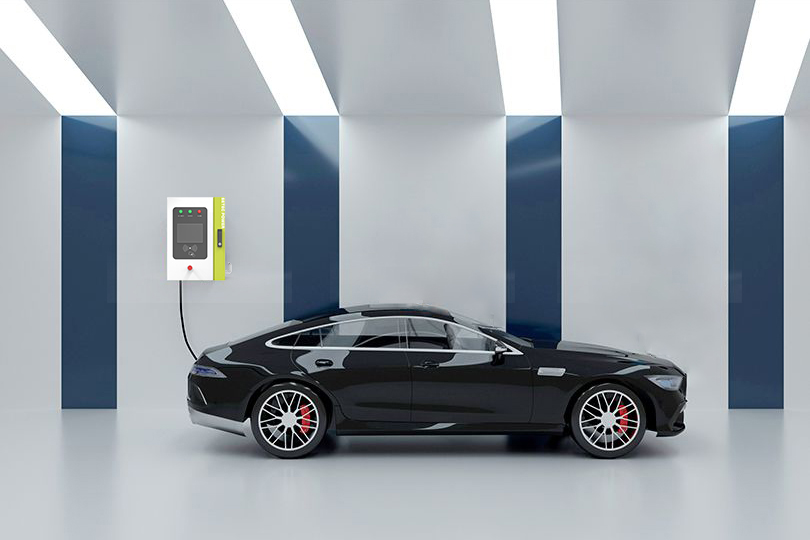Introduction
Electric Vehicles (EVs) offer multiple advantages over gasoline-powered cars. Their cost-effectiveness and environmental sustainability have given them high popularity among car enthusiasts. EVs are quite different in operation from traditional cars. Particularly important is that EV batteries require electric charging instead of any gasoline fuel.
Although there are multiple public Electric Vehicle Charging Stations (EVCS) available that offer EV charging, with limitations of time and location. Having an EVCS at home comes with multiple benefits. Nevertheless, deciding to own a private EV charging station may seem to be a challenging task. After we provide you with all the relevant information to make an informed decision, you’ll be plugged into the right EV charger in no time.
Top 6 Factors To Consider for Residential EVCS
Consider the following factors when selecting, buying, and installing an electric vehicle charging station (EVCS) for your home:
1. Charging Levels
There are three types of charging levels available for EV charging stations: Level 1, Level 2, and Level 3 charging.
Level 1: Tickle Charging
Level 1 charging can be achieved by plug-in an EV into a standard wall outlet, just like you charge your laptop or mobile. You aren’t required to install any additional hardware for achieving Level 1 charging, but it is the slowest form of charging an EV. Level 1 charging typically adds 3 – 4 miles of range per hour of a charge, suitable for very short commutes.
Level 2: Home Charging
Level 2 charging stations can deliver reliable fast charging as compared to Level 1 and its installation requires a proper setup to be done by a professional technician. Level 2 chargers can provide a range of up to 25 miles for an hour of charging, or more than 200 miles of range during an overnight charging session. Level 2 charging stations are ideal for residential and commercial buildings.
Level 3: DC Fast Charging
Level 3 is a DC fast charging option and can’t be installed at home, only available at public charging stations.
2. Charger Compatibility
After deciding on a Level 2 EVCS for your home, now select the relevant charger model which is compatible with your electric car. In selecting a particular model charger, you have to identify which connector type your vehicle’s charging port supports. There are three main types of EV chargers available with specific connector types:
- Tesla has its patented standard known as Tesla’s “Supercharger”.
- Nissan Leaf is coming with the Asian CHAdeMO standard.
- The rest of the industry adopts the SAE J1772 connector type (also called CCS ).
3. Maximum Charging Rate
EV maximum charging rate is an important consideration in EVCS design. Most of the newer model battery electric vehicles (BEVs) will accept a charging rate of 7kW+ of power but some older models and plug-in hybrid electric vehicles (PHEVs) may charge at a rate as low as 3.3kW.
We recommend you go for an EV charger that will be able to deliver at least 7.7 kW (32 Amps) and ideally 9.6 kW (40 Amps) of power. Such a high charger rating will support all new generation EVs, and you’ll future-proof your EVCS by getting the right charger today.
4. Safety & Warranty
When it comes to planning an electric vehicle charging station (EVCS) for your home, then safety should come first. There are multiple varieties of EV charging equipment available in the market. The equipment can be purchased in-store and online. However, most of the EVCS equipment offered are inexpensive products, low in quality, without any safety certifications, and very short warranties.
Before purchasing EVCS equipment for your home, make sure that the EV charger you purchase has been safety-certified by reputable organizations such as UL and ETL and has a minimum 3-year warranty period.
5. Installation Types
After doing the right selection and purchase of a suitable EVCS system for your home, the next step is to choose an appropriate installation approach. There are generally two approaches adopted for installing Level 2 charging stations in residential applications: Plug-In or Hardwired.
Plug-In Installation
Plug-in charger units have the flexibility of installing them at your desired location. You can change the location by easily removing the charger and reinstalling it at another point according to your ease. The plug-in installation will make your EVCS a portable charger station that can be easily replaced in case of any fault or problem. Plug-in installation usually suits users who are temporary residents and want to shift their homes soon.
Hardwired Installation
Hardwired chargers are permanently fixed into the wall and require a qualified electrician to disconnect or replace them. They are ideally suited for users who want to make their garage an electric vehicle charging station and don’t want to relocate its position. If you are a homeowner and planned to stay at your current residence for a longer duration, then go for a hardwired installation.
6. Overall Cost
So far we have explained all the primary requirements for choosing the right electric vehicle charging station (EVCS) for your home. Now comes the most important factor in EVCS selection i.e. cost. We deliberately put this section in the last because you should never compromise on the quality and performance of EVCS; first finalized the specs then compare prices. Cost is divided into two parts: EVCS equipment cost and installation cost.
In general, Level 2 EVCS equipment will cost you between $350 and $1500 depending on the model you choose. The installation cost may vary depending on the technical expertise and certifications held by the vendor. The typical installation cost will vary between $800 to $2,000. A standard installation for a modern house will cost on average $1,200, and take 2 to 4 hours to complete. We recommend you take at least 3 to 4 bids from different vendors for a good comparison.
Conclusion
Owning an electric vehicle charging station (EVCS) for your home appeals to most EV owners, since it will save you time and money. However, you should research the market before coming to a final decision. We have explained all the major factors that you should consider before selecting, purchasing, and installing EVCS at your residence. Hope that you have got an insight into the right information for choosing the right EVCS for your home. Nevertheless, we always recommend you hire the services of a vendor who has enough experience and holds approval from local licensing bodies.








